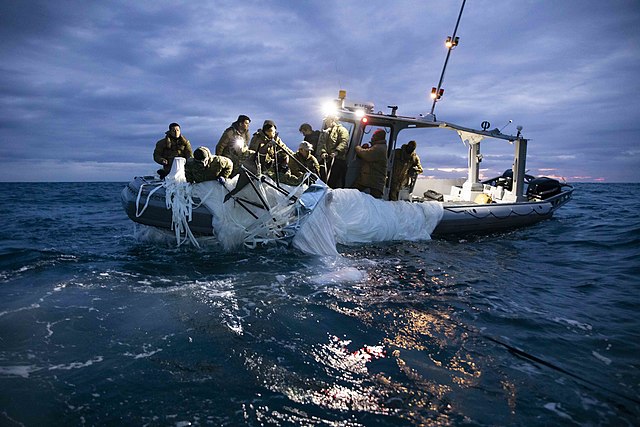Historical context grounds rising speculation for answer on Chinese balloon
U.S. Navy Petty Officer 1st Class Tyler Thompson
U.S. Navy sailors assigned to Explosive Ordnance Disposal Group 2 recover a high-altitude surveillance balloon off the coast of Myrtle Beach, South Carolina, on Feb. 5, 2023.
News coverage has recently taken a decidedly shortsighted view of a Chinese surveillance balloon that was shot down by a U.S. fighter plane over the coast of South Carolina. Despite U.S. accusations that the balloon was for spying, China continues to maintain that the balloon was used for meteorological research in a different area, but had blown off course. Given that a string of incoherent foreign policy decisions has defined the current era of international relations, it’s no surprise that China, as a rising power, might have decided that the United States is not to be trusted.
Whenever anyone refers to the age of Pax Americana, the spirit of American-led internationalism underpinning organizations like the World Trade Organization and alliances such as NATO, I have to wonder if this epoch was simply an illusory temporary situation. When a flag fades after it is flown for too long, raising it higher does not restore its color, but causes it to fade more. American power has become overextended from too much foreign intervention, exacerbating expenses and mistakes that come from managing its relations and defending allies.
The U.S. has armed forces in 750 bases around the world in about 80 countries. It would take years of studying to learn about all of the cultures and political situations in which the U.S. has become involved. The general public is only made aware of mistakes when situations have deteriorated so far that they reach disastrous levels, and the public accountability factor serves only to acknowledge mistakes rather than address issues to prevent them.
For example, the U.S. ordered a drone strike that killed multiple civilians while targeting suspected Taliban members, only to seek cooperation from the Taliban to contain the Islamic State months later. The shrapnel and spilled blood of U.S. military ventures form the raw material and ink of Chinese propaganda before their writers work into a specific script.
The biggest knowledge gaps exist between what international relations theorists often consider the division between the East and West. This framework is flawed in that it oversimplifies the real world, but it can be used to illustrate certain points. My purpose in acknowledging this divide is not to reinforce that boundary, but to point out just how similarly both sides behave when under pressure.
This piece is not, by any means, apologetic for Chinese actions. Relying on questionable groups to carry out goals while shorting long-established allies is an old tradition, which Western leaders are diligently reviving. In Europe, French President Emmanuel Macron threw a temper tantrum about France’s absence from a nuclear submarine-building deal, designed to counterbalance Chinese naval power. The Ukrainian military, generously funded by Western donations, relied on a neo-Nazi militant group, the Azov Battalion, to fight the war against Russia.
The worry about China’s balloon, if it is a spy balloon, strikes me as a red herring. While it’s scary that the spy balloon was located and shot down so close to home, what is not being said about the incident is more important than what is. China’s aggressive spying efforts are being presented with no context about the anarchic state of great power relations.
Every single foreign policy decision, whether it is directly related to China, such as the U.S. incursions toward the Spratley Islands, or indirectly related, such as the U.S. withdrawal from Afghanistan and provision of aid to Ukraine, alters the balance of power. When conditions are rapidly shifting, any state, regardless of regime type, has an interest in shoring up its own security in preparation for what every other state will or won’t do to prepare.
For all of the current concerns flooding the news about how “globalism” presents new challenges to the principle of national sovereignty, it’s also interesting that people don’t remember that China, under Ming Dynasty rule, was the most isolationist of any large nation. In the 1500s, China even went so far as to burn an entire treasure fleet to prevent the dangers of foreign entanglement and to stop a rising mercantile class that would have challenged the power of feudal nobility.
One of the reasons China is aggressively spying on other countries is that it underwent a period called The 100 Years of Humiliation following isolationist policies that left it vulnerable to foreign conquest. Chinese foreign policy is informed by this past. Unfortunately, the power plays described by offensive realism, a theory of international relations, have become the norm for the international system. Since the U.S. and China are vying for hegemony, political conflict is not inevitable, but highly probable if nations don’t learn from history.
Controlling and de-escalating disputes is the only reasonable option. The balloon can be dealt with by fear-mongering, which will bring the two nations closer to a hot war, or by examining what events really matter in the long run. With the advent of spying technologies, China already collects far more data on the U.S. and other world citizens, because companies like Apple and Google provide technology for China to build its surveillance state.
Aerial spying with weather balloons isn’t the most dangerous. In fact, during the Cold War, the U.S. and Soviet Union had an Open Skies agreement, in which they actually allowed spy planes to be flown over each other’s territories to make sure that nuclear weapons were not being prepared. This allowed policymakers to keep a cool head and not rely on assumptions or partial information, because most wars start due to preemptive actions hoping to intercept an enemy’s attack.
If there is shared information on which to base judgments, that makes both countries far safer. The Chinese government, of course, should be transparent about the balloon’s real purpose. Americans would do well to recognize that irresponsible and irrational foreign policy mistakes have contributed to a heightened security dilemma.
While spying is an insult to the idea of sovereign privacy, it is, in fact, a rational response to a chaotic world in which no apparent stabilizing hegemonic power stands uncontested. Realism shows that the most important thing to consider when assessing the character of any given country’s foreign policy is the fact that the very country being examined is itself assessing the character of every other country’s foreign policy.











